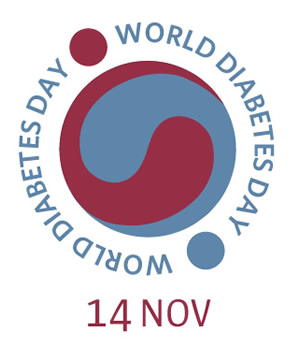
World Diabetes Day (WDD) is celebrated on 14 November to mark the birthday of Frederick Banting who, along with Charles Best, was instrumental in the discovery of insulin in 1922, a life-saving treatment for diabetes patients.
WDD was started by the International Diabetes Federation (IDF) and the World Health Organization (WHO) and according to the Collective Prevention Services (CPS), executing agency of the Ministry of Public Health, Social Development and Labour, WDD has been set aside to raise global awareness of diabetes, its escalating rates around the world and how to prevent the illness in most cases.
Diabetes is a chronic disease, which occurs when the pancreas does not produce enough insulin, or when the body cannot effectively use the insulin it produces. This leads to an increased concentration of glucose in the blood (hyperglycaemia).
Type 1 diabetes (previously known as insulin-dependent or childhood-onset diabetes) is characterized by a lack of insulin production.
Symptoms include excessive excretion of urine, thirst, constant hunger, weight loss, vision changes and fatigue. These symptoms may occur suddenly.
Type 2 diabetes (formerly called non-insulin-dependent or adult-onset diabetes) is caused by the body’s ineffective use of insulin. It often results from excess body weight and physical inactivity.
Symptoms may be similar to those of Type 1, but are often less marked. As a result, the disease may be diagnosed several years after onset, once complications have already arisen. Until recently, this type of diabetes was seen only in adults but it is now also occurring in children.
Gestational diabetes is hyperglycaemia that is first recognized during pregnancy. Symptoms are similar to Type 2 and are most often diagnosed through prenatal screening, rather than reported symptoms.
CPS says, over time, diabetes can damage the heart, blood vessels, eyes, kidneys, and nerves. CPS adds that simple lifestyle measures have been shown to be effective in preventing or delaying the onset of Type 2 diabetes, a healthy diet, regular physical activity, maintaining a normal body weight and avoiding tobacco use, and appeals to the Sint Maarten community to "Act Now" and bring about change in your families.
WHO estimates that more than 346 million people worldwide have diabetes. This number is likely to more than double by 2030 without intervention. Almost 80 per cent of diabetes deaths occur in low- and middle-income countries.
World Diabetes Day (WDD) is celebrated on 14 November to mark the birthday of Frederick Banting who, along with Charles Best, was instrumental in the discovery of insulin in 1922, a life-saving treatment for diabetes patients.
WDD was started by the International Diabetes Federation (IDF) and the World Health Organization (WHO) and according to the Collective Prevention Services (CPS), executing agency of the Ministry of Public Health, Social Development and Labour, WDD has been set aside to raise global awareness of diabetes, its escalating rates around the world and how to prevent the illness in most cases.
Diabetes is a chronic disease, which occurs when the pancreas does not produce enough insulin, or when the body cannot effectively use the insulin it produces. This leads to an increased concentration of glucose in the blood (hyperglycaemia).
Type 1 diabetes (previously known as insulin-dependent or childhood-onset diabetes) is characterized by a lack of insulin production.
Symptoms include excessive excretion of urine, thirst, constant hunger, weight loss, vision changes and fatigue. These symptoms may occur suddenly.
Type 2 diabetes (formerly called non-insulin-dependent or adult-onset diabetes) is caused by the body’s ineffective use of insulin. It often results from excess body weight and physical inactivity.
Symptoms may be similar to those of Type 1, but are often less marked. As a result, the disease may be diagnosed several years after onset, once complications have already arisen. Until recently, this type of diabetes was seen only in adults but it is now also occurring in children.
Gestational diabetes is hyperglycaemia that is first recognized during pregnancy. Symptoms are similar to Type 2 and are most often diagnosed through prenatal screening, rather than reported symptoms.
CPS says, over time, diabetes can damage the heart, blood vessels, eyes, kidneys, and nerves. CPS adds that simple lifestyle measures have been shown to be effective in preventing or delaying the onset of Type 2 diabetes, a healthy diet, regular physical activity, maintaining a normal body weight and avoiding tobacco use, and appeals to the Sint Maarten community to "Act Now" and bring about change in your families.
WHO estimates that more than 346 million people worldwide have diabetes. This number is likely to more than double by 2030 without intervention. Almost 80 per cent of diabetes deaths occur in low- and middle-income countries.

